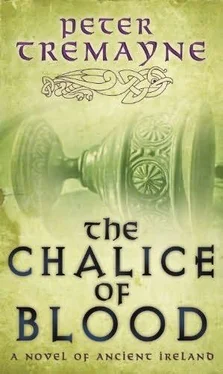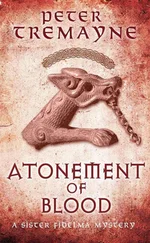Peter Tremayne - Chalice of Blood
Здесь есть возможность читать онлайн «Peter Tremayne - Chalice of Blood» весь текст электронной книги совершенно бесплатно (целиком полную версию без сокращений). В некоторых случаях можно слушать аудио, скачать через торрент в формате fb2 и присутствует краткое содержание. Жанр: Исторический детектив, на английском языке. Описание произведения, (предисловие) а так же отзывы посетителей доступны на портале библиотеки ЛибКат.
- Название:Chalice of Blood
- Автор:
- Жанр:
- Год:неизвестен
- ISBN:нет данных
- Рейтинг книги:5 / 5. Голосов: 1
-
Избранное:Добавить в избранное
- Отзывы:
-
Ваша оценка:
- 100
- 1
- 2
- 3
- 4
- 5
Chalice of Blood: краткое содержание, описание и аннотация
Предлагаем к чтению аннотацию, описание, краткое содержание или предисловие (зависит от того, что написал сам автор книги «Chalice of Blood»). Если вы не нашли необходимую информацию о книге — напишите в комментариях, мы постараемся отыскать её.
Chalice of Blood — читать онлайн бесплатно полную книгу (весь текст) целиком
Ниже представлен текст книги, разбитый по страницам. Система сохранения места последней прочитанной страницы, позволяет с удобством читать онлайн бесплатно книгу «Chalice of Blood», без необходимости каждый раз заново искать на чём Вы остановились. Поставьте закладку, и сможете в любой момент перейти на страницу, на которой закончили чтение.
Интервал:
Закладка:
‘Perhaps some of you have heard the story of Mac Cuill, the son of the hazel, who was a thief and killer in the Kingdom of Ulaidh. His crimes were so heinous and he was so unrepentant of them that he was cast adrift on the sea from the coast of Ulaidh in an open boat. After drifting for some time, he was washed close to the shore on the island that is named for the god of the oceans, Mannanán Mac Lir. There were only two members of the Faith on the island at that time but they took him from the sea. He realised that Fate had saved him for a more useful life. He travelled the island with them, preaching the Faith and founding an abbey now named after him, for he is known by the Latin from of his name — the Blessed Maccaldus.He ended his life as abbot and bishop on that island. Is that not a better contribution to life than having his dead, rotting body forgotten?’
She paused and Brehon Aillín took the opportunity to intervene in a mild tone. ‘I am sure that those gathered here do not need to be reminded of the basis of the Law of the Fénechus, Fidelma.’
She turned to him with a quick smile. ‘With due respect, I believe that you will find some who do need reminding. We believe that our native law has more in keeping with Christ’s teaching than those who support the Penitentials from Rome. However, I shall come to that later. I do need to outline the law a little more before I come to the main point. I would like to remind people of the Cáin Sóerraith , that is the law pertaining to all those who have a duty to the ruler of their clan.’
Colgú raised his head in surprise and glanced at Brehon Aillín before asking. ‘What has that to do with the matter in hand?’
‘This law, as some may know, states that a sóerchéile , a free clansman, has a duty to assist the lord of his clan. Whatever art or profession he follows, when his lord calls for help, he must obey on penalty of fines. If his lord wants him to help hunt down horse thieves or wolves, or protect the clan’s territories, the sóerchéile must obey and answer his call. He even has a duty to assist his lord in the prosecution of a blood feud. Is that not so, Saor?’
The assistant master builder jerked nervously and he licked his suddenly dry lips.
‘Do you recognise the law, Saor?’ she pressed.
‘I do,’ he answered after some hesitation.
‘And you thought you were obeying the law?’
Saor was looking confused.
‘Are you saying that it was Saor who killed Glassán?’ intervenedAbbot Iarnla nervously. ‘But he worked for Glassán. Technically, that made Glassán his lord.’
‘Not so,’ Fidelma replied before Brehon Aillín could rebuke the abbot’s intervention. ‘Glassán was not the lord of Saor’s clan. Saor was the sóerchéile , the clansman, called on to prosecute a blood feud. He did help his lord to kill Glassán as he was bound to do by his interpretation of the law. Therefore I have to say that Saor is exonerated from bearing the full blame for this crime of murder.’
Brehon Aillín made to intervene but Fidelma held up her hand. ‘Better if I came to the truth in my own way.’ The Brehon conceded and gestured for her to continue.
‘Glassán, as you know, was a master builder. What some of you may not have known was that he was master builder to the King of Laighin until ten years ago. Ten years ago he undertook to build a hall in stone for one of the King’s relatives in the south of the kingdom. However, he was a vain man who undertook many tasks at once. He did not fulfil his obligation and duty to the King to act as overseer on the building. Mistakes were made. The building collapsed, killing relatives of the King.’
‘Then why wasn’t he brought before the King of Laighin and his Brehon for this act?’ demanded Brehon Aillín.
‘He was,’ Fidelma replied calmly. ‘He argued that it was his assistant at the site who was to blame and not himself. This was technically true and the assistant had to pay the honour price of those who died to the families of the victims. But because Glassán tried to shift the blame for his own responsibility, the King and his Brehon dismissed him from the King’s service and ordered him to pay the court fines. Glassán went into exile in the kingdom of Connachta where he settled down among the Uí Briuin Sinna. He began to build up a reputation again as a builder.’
‘The Uí Briuin Sinna?’ Abbot Iarnla intervened. ‘But that’s where-’
‘Where your steward, Brother Lugna, comes from, yes,’ Fidelma said. ‘Brother Lugna knew of Glassán and his work before he went to Rome. When Brother Lugna returned from Rome and was given permission to rebuild this abbey in stone, he naturally called for someone he knew — he brought Glassán here as his master builder.’
‘No crime in that,’ snapped the sullen steward.
‘Of course not,’ Fidelma agreed. ‘But in bringing Glassán here as your master builder it did open the path that was eventually to lead to his death.’
‘How so?’ demanded Brother Lugna.
‘We are not far from the borders with Laighin and eventually Glassán’s presence here was noted. Brother Echen, for example, is from Laighin.’
Heads turned towards the stableman who stood frowning.
‘Am I being accused of involvement in killing Glassán? I am innocent. Was it not I that actually told you about his background? ’
‘Indeed it was,’ replied Fidelma calmly. ‘Brother Echen had a cousin who was in charge of the stables of the King of Laighin. He knew the story of Glassán and when his presence here was mentioned in conversation, that knowledge spread to certain people. Sit down, Brother Echen, you are not to blame, although, like Brother Lugna, you also prepared the path to his death.’
‘But you have said that Glassán paid his fines to the King of Laighin and exonerated himself before the law,’ pointed out Brehon Aillín.
‘It is true that he paid fines to the King but there were members of the families of those who perished who felt that Glassán had not answered to them for the deed. He was theperson who designed the building and should have overseen the work. The relatives of the dead received no compensation from him and did not believe he had repented. Eventually, the word came to the son of the chieftain who had perished in that building. As a young man he had sworn that his role would be the díglaid — the person who would take vengeance on behalf of his clan. He came to this abbey, ascertained that it was, indeed, Glassán who was working here and then sent for one of his clansmen to help him. That clansman was Saor.’
She paused and looked at Saor.
‘I was told that it was not long after Saor arrived that several accidents began to happen on the building site. No one was badly injured until Eadulf went to look at the site because of something that had occurred to him. Thankfully, he had a lantern with him. As he came under a half-finished doorway, he heard a lintel being pushed. It would have fallen on his head had he not raised his lantern to discover the source of the noise. The light on his features showed he was not the intended victim. One of the two would-be vengeance-seekers recognised him in time and gave him a hard shove in the back, just as the lintel fell. The lintel missed him but Eadulf smashed his head on a wooden support which knocked him out.’
Saor was looking at the ground.
‘Am I not right, Saor? You were the person who pushed the lintel.’
The assistant master builder shrugged but said nothing.
‘I accept that you felt duty bound, under law, to assist your chieftain in pursuing this blood feud,’ went on Fidelma. ‘You told young Gúasach that you were from a clan called the Uí Bairrche in southern Laighin. That was where the building collapsed, wasn’t it? Your chieftain demanded yourhelp in pursuing vengeance against Glassán. Since that is the reason for your actions, you will not feel the full weight of the law.’
Читать дальшеИнтервал:
Закладка:
Похожие книги на «Chalice of Blood»
Представляем Вашему вниманию похожие книги на «Chalice of Blood» списком для выбора. Мы отобрали схожую по названию и смыслу литературу в надежде предоставить читателям больше вариантов отыскать новые, интересные, ещё непрочитанные произведения.
Обсуждение, отзывы о книге «Chalice of Blood» и просто собственные мнения читателей. Оставьте ваши комментарии, напишите, что Вы думаете о произведении, его смысле или главных героях. Укажите что конкретно понравилось, а что нет, и почему Вы так считаете.











